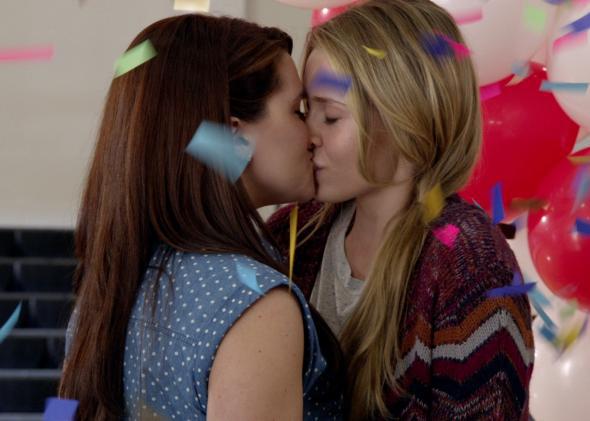When I came out, back in the last century, one of the trickiest parts of being gay was remembering the precise distinctions between the various terms of art we used in public to identify lovers, exes, friends who were gay or lesbian, acquaintances who were probably gay or lesbian, strangers we thought might be gay or lesbian, and that insistently heterosexual co-worker who must surely be a closet case. Years later, all I can summon of that coded language is the vague recollection that I once told a housemate’s mother, “No, I’m her friend, not her roommate. Her roommate lives in Ohio.”
I’m not quite sure why this came into my head while watching Faking It, which premieres on MTV tonight, but I daresay it was the shock of realizing that a couple of decades after that ridiculous conversation, a mainstream television show could proceed from the notion that two high-school girls might lie about being a lesbian couple … in order to boost their popularity.
Despite being gorgeous, height-weight-proportionate, and fluent in Amy Sherman-Palladino-style banter, best friends Amy (Rita Volk) and Karma (Katie Stevens) belong, we are told, to the tragic tribe of high-school nonentities. Amy seems to be just fine with that, but Karma is the kind of girl who fakes sudden-onset blindness in the desperate hope that her fellow students will finally notice her. To her great relief, Karma is rescued from social obscurity when Shane—the wittiest, most confident, best dressed, and, yes, the gayest guy in the school—mistakes her and Amy for a lesbian couple and takes them under his wing. And since Hester High is in Austin, “a blue oasis in the red sea of Texas,” and prides itself on being tolerant and accepting, they’re soon hanging with the cool kids, being profiled in the school newspaper, and running for homecoming queens.
The only thing that stands in the way of hers-and-hers crowns is Lauren, a Blair Waldorf wannabe (played by former Bunhead Bailey Buntain) who is enraged to find herself in Austin. “Any other place in Texas, and I would own you bitches,” she yells at Amy and Karma, and anyone familiar with high schools, real or fictional, knows she’s right.
In this case at least, Karma isn’t a bitch, but neither is Lauren. That is, she has all the trappings of mean-girl bitchdom—the cold heart, the dysfunctional relationship with her minions, the scheming ways—but unlike the pseudo Sapphists, she’s telling the truth. When she learns (by eavesdropping on a locker room conversation, naturally) that the supposed lesbians are only pretending to be a couple, she tries to tell the whole school. “They’re mocking the gay rights movement,” Lauren yells at the homecoming campaign assembly, which is, unfortunately, the truth.
Amy and Karma are privileged white girls assuming other people’s problems—and benefiting from the good will it generates in this bizarro world. The deception works, because even the right-on students at Hester High know that straight women would never, ever kiss with tongue—so when Amy pulls Karma in to a long, lingering clinch, the doubters are quieted. (Spookily enough, in the premiere of Playing House, a new comedy coming to USA on April 29, two straight women find themselves surrounded by a crowd of people yelling for them to kiss. Apparently, a good portion of the population wants to see best friends smooching.)
In a world where gay high-schoolers—or kids who are simply thought to be gay—are bullied, persecuted, and shut out of their senior proms, this fictional paradise where homosexuality is the path to popularity could easily turn offensive. The show is saved by a twist that uncorks in the very first episode: One of the girls may not be faking it after all. It’s too early to tell if this is enough to turn a potentially damaging whitewash into a fantasy of what high school could be like if homophobia were dead and buried. Until that becomes clear, I’m left wondering what you call the fake girlfriend you’re secretly in love with. Even back in the ‘80s we didn’t have a word for that.
